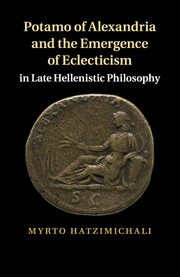Book contents
- Frontmatter
- Contents
- Acknowledgements
- Abbreviations
- Introduction
- Chapter 1 Eclecticism in modern and ancient thought
- Chapter 2 Eclecticism and Alexandria in the first century bc
- Chapter 3 Potamo of Alexandria, life and work
- Chapter 4 The eclectic system of Potamo's Elementary Teaching
- Chapter 5 Potamo and Aristotle's On the Heavens
- Chapter 6 Further references to Potamo
- Chapter 7 Conclusions
- Bibliography
- General index
- Index of passages cited
Chapter 7 - Conclusions
Published online by Cambridge University Press: 05 July 2011
- Frontmatter
- Contents
- Acknowledgements
- Abbreviations
- Introduction
- Chapter 1 Eclecticism in modern and ancient thought
- Chapter 2 Eclecticism and Alexandria in the first century bc
- Chapter 3 Potamo of Alexandria, life and work
- Chapter 4 The eclectic system of Potamo's Elementary Teaching
- Chapter 5 Potamo and Aristotle's On the Heavens
- Chapter 6 Further references to Potamo
- Chapter 7 Conclusions
- Bibliography
- General index
- Index of passages cited
Summary
A principal aim of this study has been to provide the basis for an assessment of what eclecticism meant for an ancient philosopher who was prepared to assume the term as a description of his own system or sect. The most obvious remark is that such a self-description for a philosopher is not paralleled in Antiquity, a uniqueness which makes Potamo's case all the more interesting and raises questions about why no other ancient philosopher proclaimed eclecticism in the same way, in contrast to frequent modern ascriptions of the term to a host of ancient thinkers. As ever, we have to rely almost exclusively on the information provided by Diogenes Laertius: we may now try to combine the results from the survey of the doctrines (ἀρέσαντα) associated with Potamo's sect with what can be gleaned from Diogenes concerning the sect itself and its status.
- Type
- Chapter
- Information
- Potamo of Alexandria and the Emergence of Eclecticism in Late Hellenistic Philosophy , pp. 169 - 183Publisher: Cambridge University PressPrint publication year: 2011



